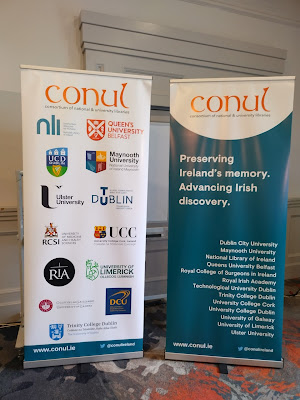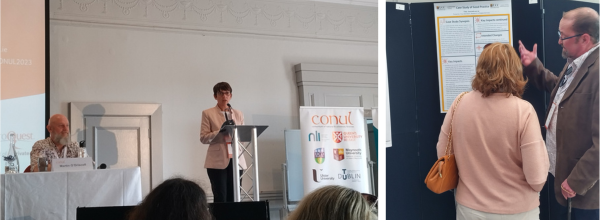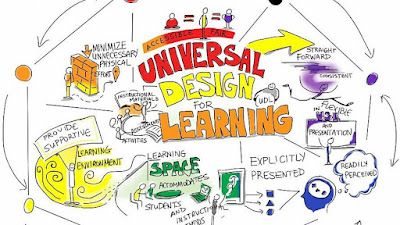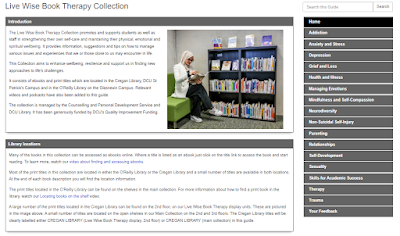Post by Rebecca Fitzgerald from UCC Library who was awarded a bursary to attend the 2023 CONUL Conference. All the images featured in this blog post were captured by the author. |
| Conul 2023 posters |
My name is Rebecca Fitzgerald, and I am currently in my second year of employment as a library assistant with University College Cork Library. It is my first full-time role.
The services desk, as the library’s first point of contact, is a bustling environment requiring engagement and attention to detail. The theme of this year’s CONUL Conference was “Sense and Sustainability: Environmental, Economic and Social Sustainability in Libraries”. Considering the many advancements in our own library’s sustainability plans I was interested to see what projects other libraries were expanding on, particularly within the Library Services Desk section.
I applied for the bursary for workers without an LIS qualification and was delighted to receive an acceptance of my application in early March. Several colleagues’ papers had also been accepted for presentation at the conference. The coming weeks would see a great deal of preparation for May, with a UCC Library CPPD-organized presentation arranged which provided the opportunity for valuable practice before the event itself. It was highly informative for me to see the preparation and commitment involved in putting these papers and workshops together.
 |
| Attendees admire this year's poster display and Rebekkah Smith Aldrich delivers the keynote speech on Wednesday |
On the morning of the 24th of May, I made the journey from Kerry to Cork for the conference. After a coffee, I met my colleague Stephanie in the city centre, and we grabbed a bus to Clayton Hotel Silver Springs where the conference was to be held. Upon entering the conference hall, we were immediately greeted by the brilliant posters submitted by delegates from several different libraries; our colleague John’s poster was amongst them and went on to win third prize in the poster competition!
The conference began at 11.15am, opened by keynote Speaker Rebekkah Smith Aldrich’s exceptional call to action to combat a climate crisis that is gaining pace at an alarming rate. It was an uplifting reminder of what libraries are capable of when we collaborate with like-minded people. I found the emphasis on identifying what needs to be done where you are particularly empowering; the climate resistance hubs were a fantastic example of initiatives formed to devise means of combatting hazards particular to the area.
 |
| UCC University Librarian Coral Black delivers a speech and Paul Davidson from UCC Library discusses his poster display |
The theme “what we can do” seemed to set the tone for the papers and workshops scheduled throughout the two days of the conference. On the first day, I was particularly interested to see how libraries implement sustainability plans and outline what they hope to expand on, which was the theme of the first parallel paper session.
Martin O Driscoll, speaker for UCC Library, gave a detailed paper about how the library’s sustainability plan has evolved since its beginnings in 2016. The goals the library started with in collaboration with UCC Buildings and Estates, such as energy saving measures, have now expanded into more concentrated projects; for example, our “Ditch the Disposable” project. This implemented a ban on disposable coffee mugs and has successfully reduced one of the building’s biggest sources of waste contamination - liquid from unfinished coffee cups.
TCD speakers Siobhan Dunne and Peter Dudley elaborated on their library’s commitment to tackle social sustainability through the Trinity Sensory Processing Project. This project aims at improving new and existing spaces within the library to create a more inclusive space, particularly for students who may find difficulty in navigating the sensory environment of the library.
James Molloy and Ursula Byrne from UCD then spoke about UCD Green Group. Established in 2019, it has harnessed staff and student involvement in a cross-campus initiative to consider what has been done, raise consciousness and work towards sustainability project goals, i.e. sustainable design. The combination of parallel papers, lightning talks and workshops made for an enlightening, varied and informative first day.
 |
| Steven Gonzalez Monserrate delivers the keynote speech on Thursday and the 360 degree camera used in the "Make, Do and Mend" Show and Tell Demonstration |
The second day began with another fascinating keynote speech from Steven Gonzalez Monserrate regarding the cloud as a storage device. He spoke about the unnerving rate of electrical consumption, noise pollution and electronic waste generated by the data centres necessary to run the cloud. The amount of water used in the cooling of data centres was startling; an estimated 5 million gallons according to his research. Steven pointed out how libraries could play a part in new ways of thinking differently about cloud storage; that the library itself carries the aesthetic of a cloud with the information it holds and can therefore be a valuable contributor to the creation of new cloud concepts.
This again echoed Rebekkah Smith Aldrich’s point about considering what is at our disposal to make improvements.
I made it a priority to attend a workshop on the second day of the conference; the “Make, Do and Mend” Show and Tell examined the sustainability initiatives made possible by makerspaces in terms of recycling, repair and social sustainability aims. One notable demonstration was Heidi Campbell from Maynooth who demonstrated the many uses of a 360 degree camera. This was used not just for a standard virtual library tour, but to create tailor-made guides providing students with a means of navigating the library space with ease. This appealed to me a great deal as a social sustainability tool for students who can find the library space daunting.
 |
Stephanie
Chen from UCC Library creates a 3-D printing mold
at the
“Make, Do and Mend” Show and Tell demonstration |
At the close of the conference, I felt all attendees were leaving inspired by all they had seen and heard. The gathering of so many library staff in one space to share their ideas reinforced the necessity for libraries to work together to make the impact needed. My first CONUL conference was an engaging and informative experience; I would heartily recommend fellow library workers to apply for the bursary and take advantage of attending this highly educational event!
 |
Doreen Lundon speaks about the introduction of aeroponic towers to UCC Library
and John Rooney from UCC Library is pictured with his prize-winning poster |








.png)




